Undergraduate Alumni
Graduates from the Tufts University Department of Physics and Astronomy advance to a variety of opportunities after completion of the program. Past graduates have gone to graduate school in a variety of fields, only a few of which include: physics, astronomy, education, engineering, computer science, and economics. Many of our graduates choose to move on to medical or dental school, while others choose to join the work force before considering furthering their education.
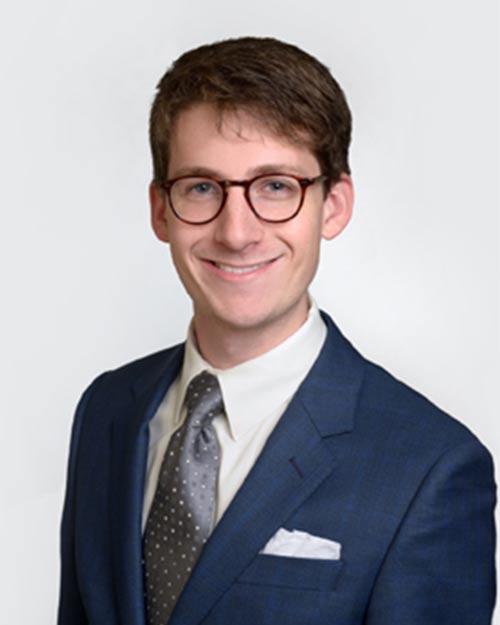
Ben Preis, A'15
Government Relations Associate
"The thought processes of physics — breaking problems down, carefully considering alternate paths and explanations — makes me a better thinker on the job."
Current Occupation: I currently work for a lobbying and consulting firm in Washington, DC that helps universities and research associations navigate the federal government. I work specifically with faculty in engineering and physical sciences, covering issues relating to the Department of Energy, National Science Foundation, National Institute of Standards and Technology, among others.
How do you use your physics background and training in your line of work?: Though I don't use the equations or theories I learned in physics on a regular basis, the broad base of knowledge I acquired in physics at Tufts has been invaluable. When interacting with faculty members in engineering or the physical sciences, having a solid foundation in physics allows me to better understand their interests and scope of research. Instead of being removed from my physics classes, my job allows me to build on my base of knowledge and expand it in a variety of directions, from mechanical engineering to materials science, albeit in a fairly informal setting. Furthermore, the thought processes of physics — breaking problems down, carefully considering alternate paths and explanations — makes me a better thinker on the job.
Did the Tufts physics department prepare you for your current career path?: The physics department did a superb job of preparing me for a field in which clear communication of science is vital. The many group projects and presentations during the higher-level physics courses taught me how to explain science in a non-technical manner in a way that nonetheless preserves the science. At work, I often speak with a non-technical audience, and being able to absorb technical research and then speak with policymakers in lay terms is one of the most important part of my job.
What is your favorite memory of your time in the Tufts physics department?: During the Physics 13 Course taught by Timothy Atherton, we had a group project to explain a topic from class (special relativity) in a video format at the 8th grade level. A group of us got together, wrote a script, and produced a four-minute video. The project was so unusual for a physics class — and an absolute blast. It's still available on YouTube! This video actually helped me get an internship in science communication, leading me on my current path. Had the physics department at Tufts not had such a strong emphasis on improving undergraduate pedagogy, I'm not sure I would have had this experience or many others that made my time in the department so beneficial and unique.
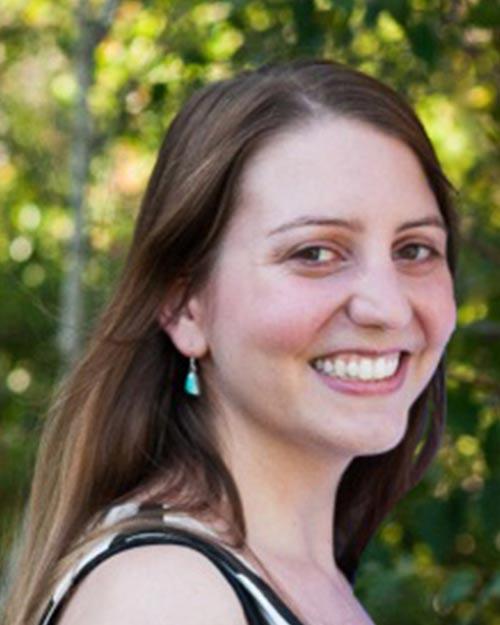
Rebekah Holtz, A'11
J.D. Candidate, Harvard Law School
Former Patent Agent, Apple
"Besides relying on my physics background to help me understand new technologies, I find myself calling upon the problem-solving and analytical skills I developed as a physics major on a daily basis."
Current Occupation: I currently work as a patent agent for a consumer electronics company. Among other things, I manage and develop a portion of the company's patent portfolio by deciding what inventions to protect and strategizing how best to protect them.
How do you use your physics background and training in your line of work?:
Generally speaking, patent agents must understand and appreciate innovations in a variety of technology areas. Having a strong foundation in the sciences proves to be extremely valuable in understanding new inventions (regardless of the underlying technology) and in effectively teaching, explaining, and precisely defining ("claiming") those inventions in patent applications.
Besides relying on my physics background to help me understand new technologies, I find myself calling upon the problem-solving and analytical skills I developed as a physics major on a daily basis. Physics taught me to approach unfamiliar situations with an open mindset and helped me develop the persistence and drive needed to tackle complex problems. My physics experiences showed me that sometimes solutions are best sought after with linear, logical thinking while at other times abstract, imaginative, and seemingly irrational ways of thinking return the greatest dividends. The ways in which I learned to think about physics are broadly applicable and adaptable to my everyday work whether I'm digging into the details of a single patent case or developing an overall strategy for the patent portfolio.
Did the Tufts physics department prepare you for your current career path?: Definitely! I've mentioned how Tufts physics provided me a solid foundation in the sciences and how studying physics taught me new ways to approach problems. What I haven't mentioned yet is how Tufts physics also helped me develop an ability to articulate and communicate complex concepts and ideas. I can think of many experiences at Tufts that challenged me to understand difficult subject matter and helped me learn how to convey my ideas relating to that material to others. Some of these experiences were informal (like discussing thoughts with peers in study groups), while others were more formal (like class writing assignments). In particular, I remember an assignment in Professor Tobin's Quantum Theory & Atomic Physics class in which we were challenged to write about recent quantum mechanics research in a way that made the research accessible and relevant to a non-physics audience, and I recall an assignment in Professor Ford's Relativity & Cosmology class in which we each aimed to write a paper that seamlessly combined a written discussion of a cosmology topic with mathematical derivations related to that topic. Through experiences like these, I learned to convey complex ideas in clear and accessible language. These skills have proved extremely valuable in my career (and in life in general!).
What is your favorite memory of your time in the Tufts physics department?: I loved spending time at the physics library in Robinson Hall. Between classes and lectures, the library was a quiet place to work. I could get through readings and intensely focus on problem sets. And when lectures and classes let out, it was a fun place to chat with the great students, TAs and professors Tufts physics is known for. During this busy cross-over time, I could always find someone wanting to talk about a crazy aspect of physics or just life in general. As an added bonus, there were often leftover cookies in the physics library from lectures or presentations earlier in the day.
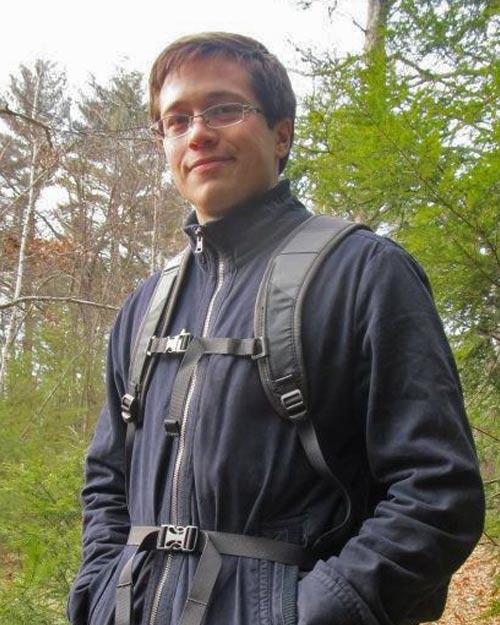
Mike Hancock, A'10
"Problem solving skills I learned throughout my degree serve [me] well."
Current Occupation: High school science teacher at Pioneer Charter School of Science in Everett, Mass. I am currently teaching two sections of junior physics, two sections of engineering to seniors, and a section of astronomy. My job is to teach students a small part of how the world works, and inspire them to want to learn more.
How do you use your physics background and training in your line of work?: I use my physics background daily in the creation and execution of my lessons. I am preparing my students for college level science classes so I am teaching the scientific mindset alongside content. Problem solving skills I learned throughout my degree serve as well in figuring out how best to differentiate instruction to different of learners as they do for figuring out why the infrared spectrometer won't work.
Did the Tufts physics department prepare you for your current career path?: I feel that the Tufts Physics department absolutely prepared me for my career. My physics background and the problem solving skills that come with it are valuable in every aspect of my job. From the more obvious planning and execution of physics lessons, to working with my colleagues to improve and develop our school, what I learned is always useful.
What is your favorite memory of your time in the Tufts physics department?: My favorite Tufts physics memories are of the study group that I struggled through quantum mechanics and E&M problem sets with. The students and professors of physics were extremely willing to help one another, creating an atmosphere of collaboration rather than competition. My favorite classes were Relativity and Cosmology with Professor Ford, and Quantum Mechanics with Professor Tobin. Both courses took common sense and stood it on its head. Both made for very interesting physics.
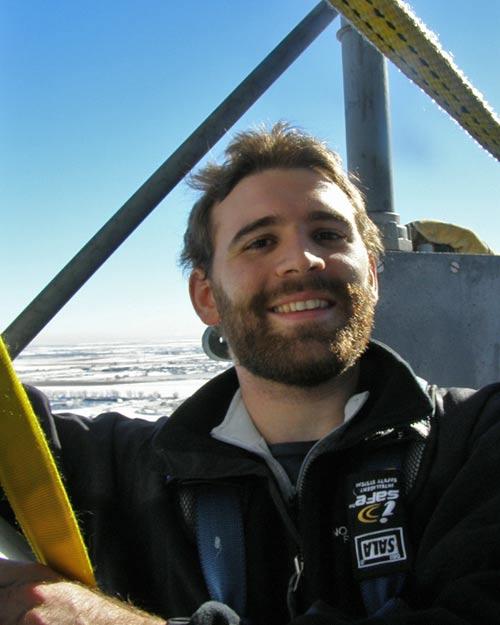
Andrew Hastings-Black, A'08
"I was always comfortable approaching my professors to talk out things I didn’t understand… Talking about physics is, in some ways, more important than performing physics: it makes you a better communicator."
Current Occupation: Researcher at Second Wind, Inc., a company that develops and utilizes technologies for measuring wind speeds in potential wind farm locations. I work on improving the performance of a commercially available sodar (sonic detection and ranging) device using new component design and digital signal processing.
How do you use your physics background and training in your line of work?: There are two big ways that my physics background prepared me for a career in sensor technology: first, experience with the mathematics that underpin all physical phenomena gives one a feel for the playing field. Studying optics and quantum mechanics made picking up acoustics really easy — they're all wave mechanics! Second, and more fundamental, is problem solving: When learning a new kind of physics, you have to figure out how to learn each new set of concepts, and then how to apply them, and how to collaborate with other people. When I'm trying to wrap my head around a new concept hoping to apply it to sodar, I feel at home navigating texts and asking questions, homing in on the kernel that will open new doors.
Did the Tufts physics department prepare you for your current career path?: Yes, definitely. I was always comfortable approaching my professors to talk out things I didn't understand, or pick up the pieces of biffed exam questions. Talking about physics is, in some ways, more important than performing physics: it makes you a better communicator. Articulating what you do understand in a conversational context cements those concepts in your head, and communicating what you don't know speeds up forming concepts correctly.
What is your favorite memory of your time in the Tufts physics department?: One day in Physics 13, I asked Professor Gallagher, "Why do electrons have charge?" Professor Gallagher had this little gleam in his eye, as he does sometimes, and he responded, "That's a great question, Andrew. Nobody knows." That caused a small explosion in my head. That was the first time I had a teacher who was an expert in his field, tell me that not only did he not know the answer, he was positive that nobody knew the answer. And it was the first time that I was able to ask questions that were unanswered scientifically. The way that science is usually taught is you have to read a textbook that is by scientists, mostly old guys with beards, and they've figured everything out, and it's all in the textbook. And this was the first time that I realized there were huge questions that nobody knew the answer to, and that was so inspiring. It made me feel like physics was an adventure that I was a part of.
There was another time when I went to Professor Ford's office hours for General Relativity — I was trying to understand the expansion of the universe — and I said, "It seems to me that one way of explaining the geometry of the universe is to imagine the universe all on the surface of a balloon, and the surface of the balloon is expanding." I was prepared to hear why that wasn't what it was, but Professor Ford said, "Oh yes. It could be that." And I just sat there and felt like I was flying through space with Professor Ford. It was totally amazing to think that I had the power to come up with ideas that describe the universe, and that Professor Ford was so willing to validate the idea. He pulled me up, and all it takes is little moments like that to just totally hook you. Physics professors at Tufts did it all the time.
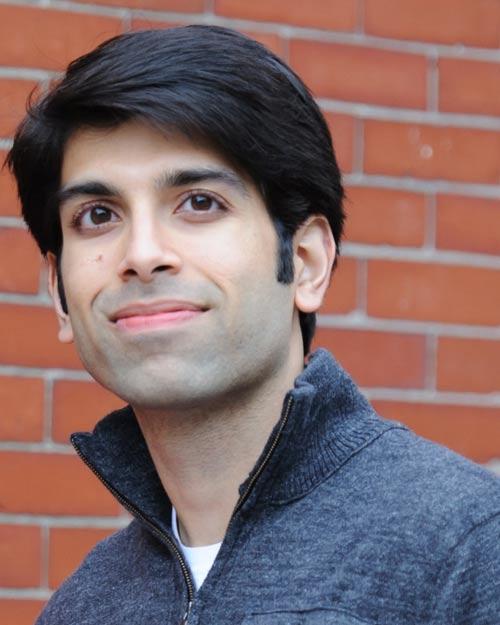
Krish Kotru, A'08
"…these experiences subconsciously alerted me to how widely applicable a physics education can be."
Current Occupation: I am a graduate student working toward a PhD in the MIT Aeronautics and Astronautics department and Draper Laboratory.
How do you use your physics background and training in your line of work?: Physics plays an essential role in my work. As a graduate student, I contributed to the development of optical and atomic sensors intended for precise timekeeping and navigation. These systems often bring together a wonderful blend of applied quantum physics, lasers and electro-optics, electronics, and vacuum technology. Having a physics background helped me understand my experimental apparatus at the level of its individual components and as a system of interacting parts. And on occasions when the experimental problem was "real physics" (rather than just a broken component), I used conceptual tools like the Schrodinger equation, ray optics, and statistical analysis to model the experiment and get a better grasp of what was really going on.
Did the Tufts physics department prepare you for your current career path?: Absolutely! One fantastic and unique thing about Tufts Physics is that it nurtures long-term relationships between undergraduate students and faculty. For example, my undergraduate thesis on the growth of thin metallic films built on many semesters of hands-on work in Roger Tobin's lab. My work was closely supervised Prof. Tobin himself. This exposure to independent laboratory research let me hit the ground running as a young graduate student.
What is your favorite memory of your time in the Tufts physics department?: I couldn't choose just one…
- My modern physics lecturer, Prof. Gallagher, once plotted an undergrad's self-evaluation of his/her comfort with quantum physics as a function of time. Apparently, you never get quite as high up along the y-axis as you were at the beginning of the modern physics course.
- I heard a couple of inspiring talks early on during my undergraduate career. One was by astronaut Jeff Hoffman, who spoke on the value of manned space exploration while regaling us with stories about his space walks—one of which was part of the mission to repair the Hubble Space Telescope. The other was by Prof. Tobin, who combined his love for physics and baseball to statistically analyze the effects of steroid usage on home run production in Major League Baseball. I think these experiences subconsciously alerted me to how widely applicable a physics education can be.
- During my senior year, Prof. Tobin and I attended the annual meeting of the American Physical Society in New Orleans. We needed to find a restaurant for dinner, so in the midst of spring break season we ended up strolling down Bourbon Street of all places in search of food. It's not often that you find yourself caught between inebriated spring breakers and your research mentor (I hope).
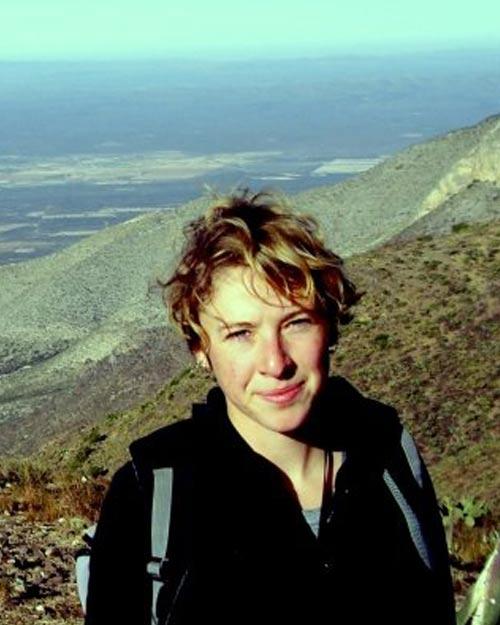
Natalie Wolchover, A'08
"…I got to work on international collaborations, present research at a conference, co-author several papers and, best of all, do real science!"
Current Occupation: Staff Writer at Life's Little Mysteries, a science website. I report on cool new research, answer common science questions, and debunk paranormal claims such as UFO sightings.
How do you use your physics background and training in your line of work?: I often write articles about new physics research, and answer questions people have about the way the universe works. Obviously a solid background in the field helps with those assignments, but it comes into play when I'm writing about seemingly unrelated topics, too. Learning physics instills you with a logical way of thinking, not just about physics problems but about problems in all areas of science, and life. When I’m consulting experts for an article I'm writing, my familiarity with the scientific method enables me to know what questions to ask, and what aspects of the topic need to be explained for lay readers.
Did the Tufts physics department prepare you for your current career path?: Yes. Aside from giving me a solid understanding of core physics concepts through small classes and lots of one-on-one time with professors, I also got involved in nonlinear optics research with Professor Fio Omenetto. I got to work on international collaborations, present research at a conference, co-author several papers and, best of all, do real science! Though I did not choose to pursue academic research, my experience in the lab as an undergrad gave me an understanding of the scientific process that has helped tremendously in my work as a science writer. It also looks impressive on a resumé, regardless of what career path you end up on.
What is your favorite memory of your time in the Tufts physics department?: There was a period of time during my sophomore year when I was virtually obsessed with quantum mechanics being wrong. The laws of physics are supposed to be elegant and intuitive, I thought, but quantum theory just seemed absurd. After hours of discussion with fellow physics majors and seasoned professors, I eventually learned to live with the murkiness of the subatomic world. Turns out, my experience mirrored that of every student of physics before me or since. I was having a "God does not play dice" moment à la Albert Einstein — a rite of passage of every physics major, and a transformative realization about the wondrous strangeness of the universe!
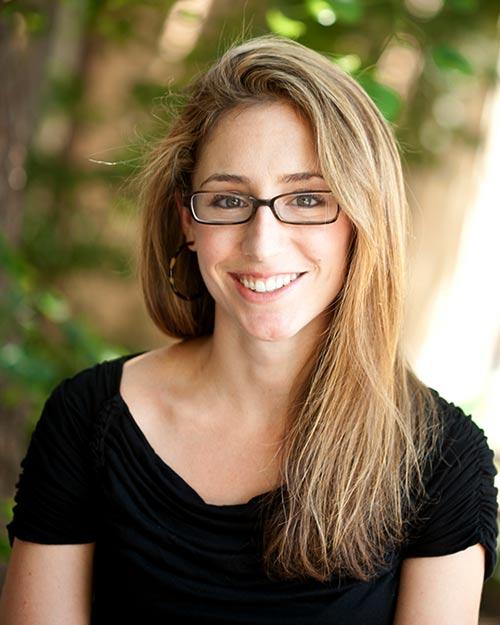
Shannon Curry, A'04
"For the first time, I saw the world in a completely different way and could discuss that with really fantastic, thoughtful people."
Current Occupation: I am currently a post-doc at UC Berkeley in the Spaces Sciences Laboratory working on NASA's next Mars Scout- MAVEN (Mars Atmosphere and Volatile EvolutioN).
How do you use your physics background and training in your line of work?: Physics is part of my daily life because my primary area of research is developing computer simulations of planetary atmospheres. The solar system environment, specifically the interaction of the Sun or a star with a planetary atmosphere, is really complex; building a simulation that describes it well requires bringing a number of different areas of physics together (plasma physics, fluid dynamics, radiative transfer and electromagnetism). Learning how to solve problems with physics is incredibly rewarding, and we are really lucky to live in an era of technology where we can actually 'test' how physics works in space by taking in-situ measurements at places like Mars and Venus.
Did the Tufts physics department prepare you for your current career path?: It absolutely did- in fact I wish I had taken better notes because when I began my PhD 4 years later, there was no transition period and we were expected to have a really solid base from day 1. In addition to the academics, I really appreciated the research opportunities that Tufts provided or encouraged. My research as an undergraduate was actually at the Harvard Smithsonian Center for Astrophysics using Chandra data (with the encouragement of my adviser, Austin Napier) since not many of the faculty at that point were doing data analysis in x-ray astrophysics. Starting research as early as possible was enormously helpful later on in graduate school and now as a research scientist!
What is your favorite memory of your time in the Tufts physics department?: I really, really enjoyed taking Modern Physics with Gary Goldstein and Quantum Mechanics with Roger Tobin the same semester. For the first time, I saw the world in a completely different way and could discuss that with really fantastic, thoughtful people. I also remember taking astrophysics classes with Bill Waller and he had incredible stories about observing that inspired me to spend a semester near Kitt Peak.
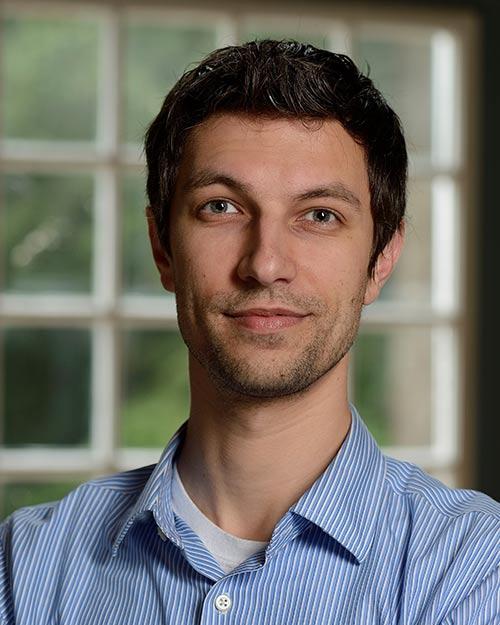
Kevin Lewis, A'03
Assistant Professor in the Department of Earth & Planetary Sciences at Johns Hopkins University
"Although my graduate work had a more geological focus, an undergraduate physics major provides a fantastic foundation for a wide range of possible careers, particularly in the natural sciences."
Current Occupation: I am currently an Assistant Professor in the Department of Earth & Planetary Sciences at Johns Hopkins University.
How do you use your physics background and training in your line of work?: My research in planetary geophysics on Mars and other planets lies at the intersection of physics, math and geology. Much of my work involves the analysis of planetary gravity and magnetic fields from a physics-based perspective. The methods I use every day stem directly from the understanding gained in my undergraduate physics curriculum - in particular, Mechanics and E+M. The knowledge gained in Optics and Quantum Mechanics at Tufts have been especially valuable for my work in planetary remote sensing. Although my graduate work had a more geological focus, an undergraduate physics major provides a fantastic foundation for a wide range of possible careers, particularly in the natural sciences. Exposure to best-practice research methods and software tools in Prof. Cebe's lab were a huge benefit and provided a smooth transition to graduate school!
Did the Tufts physics department prepare you for your current career path?:
What is your favorite memory of your time in the Tufts physics department?: Prof. Cebe's Optics class was my favorite! I am also very grateful to Krzysztof Sliwa for donating his time one summer to giving myself and David Attanasio ('03) lessons in Intermediate Mechanics when we couldn't fit it into our course schedules - as a professor myself now, I understand how generous this was!
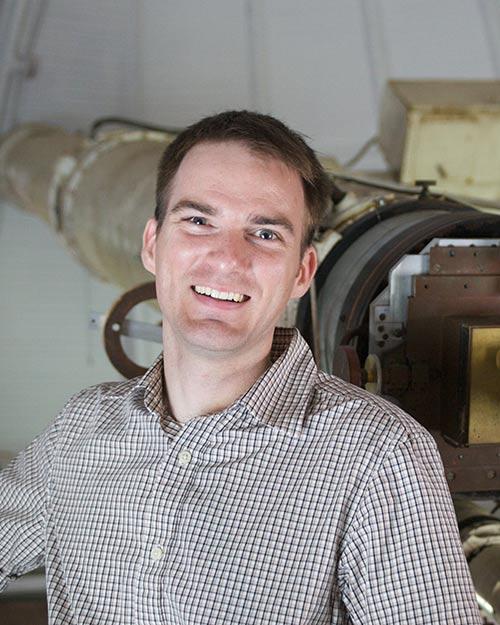
Seth Redfield, A'98, NEC'98
"Tufts [had prepared] me with a solid foundation in technical knowledge, but perhaps even more importantly, Tufts also provided me with an opportunity to do research and interact one-on-one with faculty in physics and astronomy."
Current Occupation: Assistant professor of astronomy at Wesleyan University in Middletown, CT. I use the Hubble Space Telescope and 10-meter ground-based telescopes to study the composition and structure of the atmospheres of distant exoplanets, and the gas and dust drifting among the nearest stars. I also teach undergraduate and graduate courses on a wide range of areas in astrophysics.
How do you use your physics background and training in your line of work?: I use it every day in my research and in my teaching. As a researcher and an instructor, I am continually building on the foundation of my undergraduate and graduate work. In fact, my most heavily used references today are my first introductory textbooks from Tufts in calculus and modern physics. I also think my experience at Tufts helps me to be a better mentor to undergraduates at Wesleyan, an institution similar to Tufts in many ways.
Did the Tufts physics department prepare you for your current career path?: Absolutely. Tufts had certainly prepared me with a solid foundation in technical knowledge, but perhaps even more importantly, Tufts also provided me with an opportunity to do research and interact one-on-one with faculty in physics and astronomy. This close interaction gave me a deeper contextual understanding of the field, and solidified the classroom work I had gotten. I went on to graduate school in astrophysics at the University of Colorado in Boulder and then a postdoc at the University of Texas in Austin. I found that many of my fellow graduate students, who had attended much larger undergraduate institutions and perhaps had access to a wider range of courses, did not have this intimate experience with their foundational material, or in research. So, I have always been grateful for that component of my education at Tufts, and it's a reason why working at Wesleyan has been so appealing to me.
What is your favorite memory of your time in the Tufts physics department?: Oh, I have lots of them. I, of course, enjoyed the astronomy courses and the research I did with Professors Lang and Willson. The classes were small and the research exciting. I still remember being amazed by the propagation of light lecture in Professor Mann's introductory physics course. I also remember fondly my thermodynamics course with Professor Gunther.
I also took an independent study with Professor Oliver, reading the Feynman lectures; it was awesome, and really hard for me! I can remember talking with him and struggling with the concepts, and looking back on it now, I just feel very lucky that I — someone who was just barely learning quantum mechanics for the first time and trying to conceptualize these ideas — was able to talk to someone who had been working on it for decades, and so I remember that very fondly.
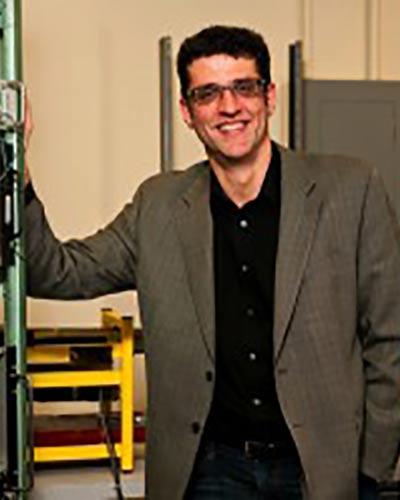
Steve Eliopoulos, A'89
"Every day, I'm confronted with decisions that involve [Tufts] training."
Current Occupation: Director/cameraman who shoots and produces broadcast TV ads (e.g. Honey Dew Donuts), as well as corporate video and online web content. I also occasionally do additional shooting for feature film and television productions like Ben Affleck's "Town" and TV's "Boston Legal."
How do you use your physics background and training in your line of work?: Nearly everything I do on a daily basis with cameras, or with light, color, exposure, lenses and particularly in today's digitally-driven world has some connection to my physics background if nothing else just in terms of understanding the nature of the equipment and processes. As an adjunct professor in the Boston University cinematography department, I teach students about refraction of lenses, the law of reflection, and the basic mathematics of exposure. Every day in my work, there's something I'll do that harkens back to my physics training.
I also do time lapse photography. That is all math-based: figuring out integrals and the right exposure for capturing things over different time periods. I'm the go-to guy in the area because I approach it differently than others might: I approach it without any fear factor because of a basic understanding of how cameras, lenses, films and light all work. There's no intimidation about a new camera system.
Did the Tufts physics department prepare you for your current career path?: Most definitely! Not only academically in terms of actual content knowledge of light, color, electronics systems, etc., but perhaps more importantly in the aspect of analytical training that is only learned in the lab. Every day, I'm confronted with decisions that involve this training, for example a decision on set that requires me to evaluate technical parameters prior to shooting something. Even at home where I have taken on many a home renovation project over the years, much of being able to do that is attributable to the experience working at Soudan 2 back in the late '80s. Tufts was involved in an international collaboration attempting to detect proton decay events. I helped build a component of the experiment, which was located in an underground mine in Minnesota so that the iron in the ground would protect the experiment from cosmic ray interference.
What was the most rewarding experience you had in the Tufts physics department?: Most of my favorite memories revolve around my time in Bacon Hall (the department headquarters prior to Colby Street) and out in Minnesota underground at the Soudan 2 site. I spent many days and months in the Bacon Hall machine shop on work related to either the Soudan 2 experiment, or on my Senior Thesis measuring the muon particle lifetime. Those were all great memories. Professors Bill Oliver (my advisor), Tony Mann, Austin Napier, among others, were all formative figures during my time in the department.
Do you continue to pursue your interest in physics? Oh, yes! My bookshelves can't possibly be any more rammed full with publications ranging from Kip Thorne's book on Black Holes & Warped Space, to Tufts' own Allan Everett's new book that just came out. Space and Time are particular nexus points of interest for me. Dark Energy and Dark Matter are just beginning to peak my interest as well! My wife and I have also created the Steven J. Eliopoulos and Joyce J. Eliopoulos Endowed Fund for Undergraduate Research in Physics and Astronomy, which will financially support a summer scholar in the department of physics and astronomy.